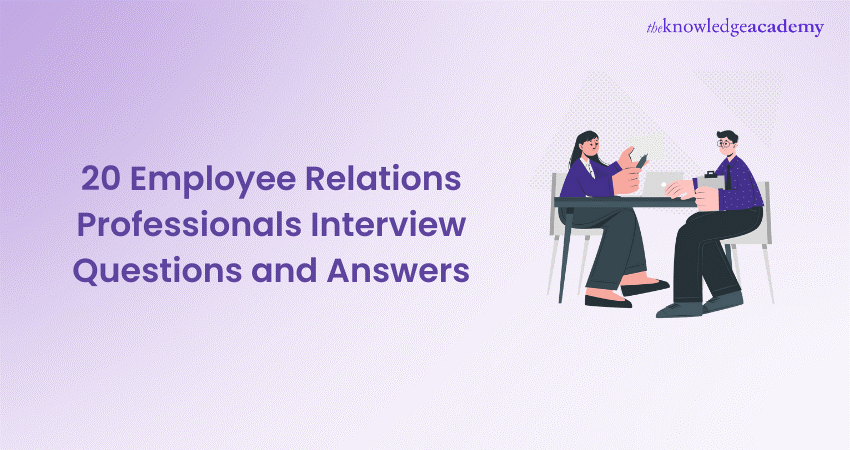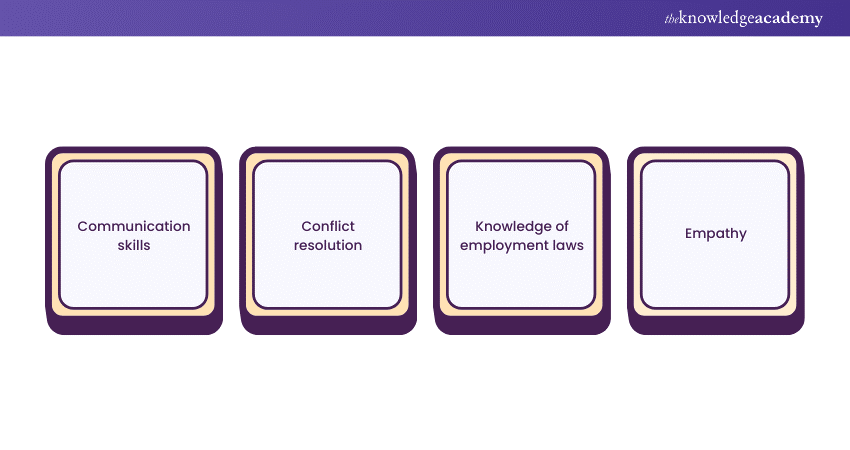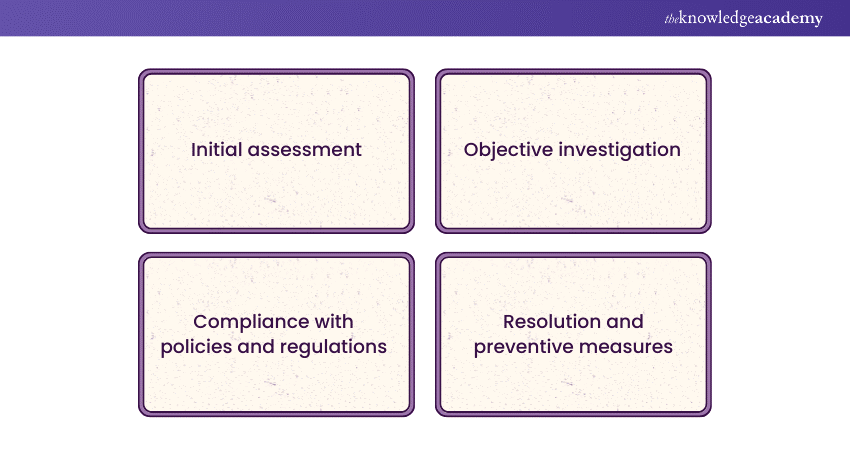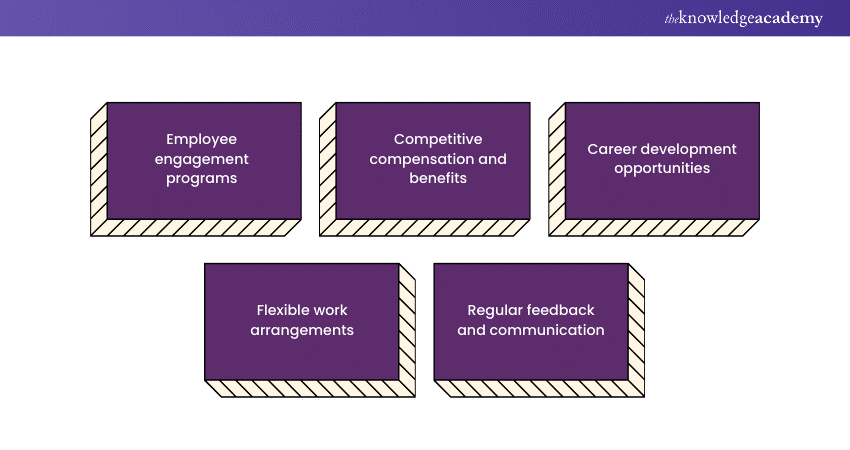We may not have the course you’re looking for. If you enquire or give us a call on 01344203999 and speak to our training experts, we may still be able to help with your training requirements.
Training Outcomes Within Your Budget!
We ensure quality, budget-alignment, and timely delivery by our expert instructors.

When seeking an Employee Relations role, the interview holds significant importance as it allows the hiring manager to assess a candidate's communication skills and demeanour. During the interview, candidates discuss how they would approach hypothetical scenarios, offering insight into their problem-solving abilities. To enhance preparedness and confidence for interviews, it's beneficial to review a set of Employee Relations Interview Questions. This process aids candidates in formulating thoughtful responses and better navigating the interview, showcasing their suitability for the position.
Table of Contents
1) Employee Relations Specialist Interview Questions
a) What key qualities are essential for an Employee Relations Specialist to be effective?
b) Are you familiar with the laws and regulations that govern Employee Relations?
c) How do you manage a disagreement among employees?
d) Provide an example of a time when you successfully mediated a conflict between two employees.
e) What is your process for investigating claims of discrimination or harassment?
f) In your perspective, what stands out as the most crucial attribute in an Employee Relations manager?
g) If an employee was dissatisfied with a change in their work responsibilities, how would you handle it?
h) How do you stay abreast of developments in employment law?
i) Describe a time when you made a mistake in your duties. How did you rectify it?
j) How well do you handle stress? Can you think clearly in high-pressure situations?
k) When is it appropriate to give employees negative feedback?
l) Describe your process for giving positive feedback to an employee.
m) What do you think is the most important thing an Employee Relations Specialist can do to maintain a positive work environment?
n) We want to improve our employee retention rates. What strategies would you use to do this?
o) How often should you hold employee meetings?
p) Which Employee Relations software are you familiar with using?
q) Describe a time when you had to make an unpopular decision in order to improve Employee Relations.
r) How do you stay up-to-date on changes in employment law?
s) Can you provide examples of successful employee engagement initiatives that you've implemented in the past?
t) Do you have any experience conducting exit interviews or other outplacement services?
2) Conclusion
Employee Relations Specialist Interview Questions
Here are the questions with expertly curated answers most likely to land you the dream Employee Relations job:
1) What key qualities are essential for an Employee Relations specialist to be effective?

Employers pose this question to gauge your professional values and their alignment with the company's ethos. Emphasise qualities you possess or are eager to develop. For instance, you can use the following sample answer to construct yours:
"As an Employee Relations Specialist, I prioritise excellent communication skills, robust problem-solving abilities, and a profound understanding of employment law.
Effective communication is vital for success in this role, involving clear articulation of policies, attentive listening to employee concerns, and providing viable solutions. This necessitates adept communication with both management and staff to ensure alignment and comprehension of expectations.
Robust problem-solving skills are crucial for addressing issues promptly, devising innovative solutions, and fostering positive relationships among involved parties.
Lastly, comprehensive knowledge of employment law is indispensable. This understanding prevents potential legal complications, ensuring adherence to laws governing hiring, termination, and other employment aspects."

2) Are you familiar with the laws and regulations that govern Employee Relations?
Employers pose this question to assess your knowledge and experience in performing job duties. In response, emphasise your familiarity with relevant laws and regulations, detailing how they apply to Employee Relations specialists. If lacking direct experience, express a willingness to acquire this knowledge if hired. A sample answer can be:
"Certainly, I possess extensive familiarity with the laws and regulations governing Employee Relations. In my current role as an Employee Relations Specialist, I collaborate closely with HR departments to ensure compliance with state and federal labour laws. Additionally, I engage in thorough research on the latest developments in Employee Relations legislation, actively participating in seminars and workshops to stay abreast of changes.
Recognising the significance of a comprehensive understanding of the legal framework in Employee Relations, I am committed to staying informed about recent rulings and legislative decisions. I am confident in my ability to contribute the necessary expertise to uphold a safe and compliant workplace environment for your organisation."
3) How do you manage a disagreement among employees?
Interviewees need to showcase their conflict management skills as a part of Employee Relations when answering this question. For example:
“In handling a disagreement among employees, my approach is rooted in effective communication, mediation, and a commitment to finding a fair resolution. First, I initiate private conversations with each party involved, allowing them to express their concerns openly. Actively listening to both sides helps me grasp the core issues. Next, I facilitate a structured discussion where each person can voice their perspective while ensuring a respectful environment. Mediation techniques, such as finding common ground and exploring compromises, come into play. If necessary, I involve relevant stakeholders or HR personnel to ensure a comprehensive resolution. Throughout the process, my goal is to foster understanding, encourage collaboration, and ultimately reach a solution that aligns with company policies and maintains a positive working environment.”
4) Provide an example of a time when you successfully mediated a conflict between two employees.
Your answer can be framed along the following lines:
“In a recent experience, I effectively mediated a conflict between two team members who were grappling with workload disparities. By attentively listening to their concerns, I identified the underlying issues and crafted a solution that addressed both parties' needs. By proposing a compromise involving workload adjustments and implementing regular check-ins, I ensured that each employee felt heard and respected. The result was a successful resolution where both team members expressed satisfaction and a renewed willingness to collaborate harmoniously. This instance underscores my commitment to utilizing effective communication and problem-solving skills to navigate and resolve workplace conflicts, fostering a positive and collaborative work environment.”
5) What is your process for investigating claims of discrimination or harassment?

Employers pose this question to gauge your capability and experience in executing job responsibilities. Your answer needs to be along these lines and can be framed according to the following template:
“In my approach to investigating claims of discrimination or harassment, I initiate with a comprehensive assessment, reviewing facts and circumstances to determine the validity of the complaint and the need for further inquiry. If required, I conduct interviews with witnesses and gather relevant evidence, including emails or texts. Prioritizing the complainant's perspective, I aim to foster a sense of being heard and respected throughout the investigation. Ultimately, I present a detailed report of findings and offer recommendations for addressing the situation. My objective is to ensure equitable and respectful treatment for all parties involved in the process.”
Gain a detailed understanding of HR Management with our Certified HR Advisor Course – Sign up now!
6) In your perspective, what stands out as the most crucial attribute in an Employee Relations manager?
You can answer this question according to this template:
“In my perspective, the most crucial attribute in an Employee Relations manager is adept communication. Clear and effective communication is fundamental in fostering a positive work environment and resolving conflicts. An Employee Relations manager must skilfully convey policies, procedures, and expectations, ensuring understanding among both employees and management. Moreover, the ability to listen actively and empathetically is vital for addressing concerns and establishing trust. Effective communication facilitates the smooth flow of information, minimizes misunderstandings, and promotes a collaborative and harmonious workplace.”
7) If an employee was dissatisfied with a change in their work responsibilities, how would you handle it?
Employers pose this question to gauge your experience in managing workplace conflicts and to ensure you can instill confidence in employees amid changing work responsibilities. Your response can include:
"I would prioritise my interpersonal skills to address the issue. I believe in actively listening to the employee's concerns, demonstrating their importance, and ensuring they feel respected. Following this, I would transparently communicate the reasons behind the changes and highlight the organizational benefits. Additionally, I would explore alternative solutions or compromises that align with both the employee's needs and the company's objectives. This commitment to open communication and collaboration is foundational in resolving conflicts, fostering trust, and enhancing overall job satisfaction."
8) How do you stay abreast of developments in employment law?
Your answer may include the following in your answers:
“In staying abreast of developments in employment law, I adopt a multifaceted approach to ensure comprehensive understanding and compliance. Regularly engaging with legal publications, journals, and reputable online platforms helps me stay informed about the latest amendments, precedents, and emerging trends in employment law. Additionally, I actively participate in relevant workshops, seminars, and conferences, seizing the opportunity to learn from legal experts and gain practical insights. Networking with professionals, especially those with legal expertise, allows for valuable discussions and knowledge exchange. Lastly, I prioritize continuous learning through enrolment in courses or certifications dedicated to employment law updates. This proactive strategy ensures that I remain well-versed in the dynamic landscape of employment law, enabling me to navigate and apply legal considerations in the workplace effectively.”
9) Describe a time when you made a mistake in your duties. How did you rectify it?
Your answer needs to be along these lines and can be framed according to the following template:
"I can recall an instance where I made a mistake in my duties. I inadvertently overlooked a crucial detail in a report that I was responsible for submitting. Realizing the error, I immediately took ownership of the mistake. I approached my supervisor, explained the situation transparently, and outlined the steps I would take to rectify it. To address the error, I committed extra time to thoroughly review and revise the report, ensuring accuracy and completeness. Moreover, I implemented additional checkpoints in my workflow to prevent similar oversights in the future. This experience taught me the significance of diligence and thoroughness in my responsibilities and reinforced the importance of proactive problem-solving and continuous improvement."
10) How well do you handle stress? Can you think clearly in high-pressure situations?
You can answer this question according to this template:
"As an Employee Relations Specialist, I have a well-established history of successfully managing stress in high-pressure scenarios. Recognizing the need for quick thinking, I am confident in my ability to stay composed and think on my feet.
Throughout my career, I've navigated challenging situations involving difficult employees and high-stress environments. Maintaining composure under pressure is a key strength of mine, complemented by strong problem-solving skills that enable me to devise creative solutions to intricate problems.
Moreover, my extensive experience has honed my interpersonal skills, facilitating effective communication for conflict resolution. I've learned to stay focused and organized, even when confronted with tight deadlines or unexpected changes. This background positions me as a resilient professional capable of thriving in the demanding field of human resources."
Master the intricacies of employment law with our Employment Law Training – Sign up now!
11) When is it appropriate to give employees negative feedback?
Try to structure the answer like the sample presented below. Incorporate your experiences and anecdotal examples to keep the answer engaging:
"Recognising the significance of delivering both positive and negative feedback is crucial for fostering employee development. When it comes to negative feedback, I prioritise professionalism, directing the focus on specific behaviours or performance rather than individual attributes.
Timeliness is key; addressing issues promptly allows for swift and effective resolution. While delivering negative feedback, maintaining composure and steering clear of personal attacks is essential. I emphasise constructive criticism, offering specific suggestions for improvement and providing support to empower employees in making positive changes. This approach ensures that expectations are clear and employees receive the guidance needed to enhance their performance. By fostering an environment of open communication and growth, constructive feedback becomes a tool for continuous improvement within the workplace."
12) Describe your process for giving positive feedback to an employee.
Your answer may be framed something like the following:
"Delivering positive feedback is an integral aspect of fostering a conducive work environment. My approach involves a thorough understanding of the individual's performance, goals, and potential challenges. This allows me to tailor my feedback to the specific context, ensuring its relevance and impact.
Crafting a personalized message is crucial, emphasizing the specific actions or behaviours that contributed to the success. Recognition of the employee's effort is a key element in my positive feedback. Whenever possible, I prefer delivering feedback in person to establish a more personal connection and ensure clarity in communication.
Post-feedback, I follow up with the employee to address any questions and offer additional support if needed. This process not only acknowledges achievements but also promotes a culture of appreciation and continuous improvement within the team."
13) What do you think is the most important thing an Employee Relations specialist can do to maintain a positive work environment?
Try including something similar in your answer based on your style and preferences:
"I consider maintaining a positive work environment to be a core responsibility for an Employee Relations specialist. My approach centres on fostering open communication between employees and management, creating a space where concerns and feedback are welcomed. Actively listening and responding promptly demonstrate the value placed on their voices, nurturing trust and respect. Proactivity in addressing potential issues before they escalate is crucial to prevent bigger problems. Moreover, ensuring that employees have access to necessary resources and support, such as training opportunities or counselling services, contributes to a healthy, productive work atmosphere. These collective efforts align with my belief in the significance of empathy, compassion, and a positive attitude in enhancing Employee Relations."
14) What strategies would you use to improve our employee retention rates?
You can answer this question according to this template:

"Improving employee retention rates hinges on cultivating an environment where employees feel valued. I advocate for fostering a culture of open communication, involving regular meetings to address concerns and offer performance feedback. Ensuring employees have the necessary resources for success, including accessible training opportunities and up-to-date tools, is paramount. Moreover, recognizing and rewarding employees' hard work through bonuses, promotions, or other forms of acknowledgement contributes to job satisfaction and loyalty. My proactive approach focuses on creating a workplace where employees find fulfilment, fostering a positive atmosphere that naturally enhances retention rates."
15) How often should you hold employee meetings?
Your answer may be framed something like the following:
"Effective communication is crucial for Employee Relations, and regular meetings are vital. I advocate for holding employee meetings monthly or more frequently as needed. These gatherings are instrumental in informing the workforce about company policies, procedures, and workplace changes. Furthermore, they provide a forum for open dialogue, allowing employees to voice concerns, share opinions, and contribute ideas for improvement. The meetings also serve as a platform for managers to gain valuable insights into employee sentiments, fostering trust and collaboration. Recognizing outstanding performance and rewarding hardworking employees during these sessions contributes to a positive workplace culture. Regular meetings are a cornerstone in nurturing effective communication and a collaborative work environment."
16) Which Employee Relations software are you familiar with using?
Try including something similar in your answer based on your individual style and preferences.
"I have extensive experience with various Employee Relations software, including HRIS systems like ADP and Paychex. I'm also proficient in specialized Employee Relations tools such as PeopleFluent, which are designed for efficient workforce management and encompass performance tracking, benefits management, and streamlined onboarding. Moreover, my experience extends to applicant tracking systems like Taleo and iCIMS, which are valuable for effective recruitment and hiring processes. I'm also adept at utilizing customer relationship management (CRM) software, such as Salesforce, which aids in building and managing relationships with both current and potential customers. This diverse skill set allows me to navigate and leverage different software tools to enhance Employee Relations and overall organizational efficiency."
17) Describe a time when you had to make an unpopular decision to improve Employee Relations.
Emphasise your experience in dealing with such situations and incorporate anecdotes from previous such encounters. Your answer may have the following points included:
"In a previous role as an HR manager, I faced a challenging decision to enhance Employee Relations. Recognizing a pattern of frequent tardiness affecting production, I proposed and implemented a policy mandating employees to arrive by 8 a.m. Latecomers received verbal and written warnings, with termination after three offences. While unpopular, this decision aimed to ensure punctuality and smooth workflow. Similarly, I navigated the need for change at a large organisation, making tough decisions to implement new processes and systems. Despite initial resistance, these choices were crucial for the company's growth and long-term success, demonstrating my commitment to fostering positive Employee Relations aligned with organizational goals."
18) What would be your approach to dealing with a difficult employee?
Incorporate the following points in your answer:
"Addressing a challenging employee involves a systematic understanding of the root cause. Identifying factors like lack of understanding or feeling overwhelmed is crucial. Once the cause is pinpointed, collaboration with the employee creates an action plan, incorporating additional training, support, or stress-reduction measures. Effective communication is pivotal, emphasizing active listening and respectful feedback to foster trust. Maintaining a positive attitude and remaining open-minded throughout the process is essential, ensuring a constructive and solution-oriented approach to resolving conflicts in the workplace."
19) Can you provide examples of successful employee engagement initiatives that you've implemented in the past?
Your answer needs to give evidence of your past experiences with implementing engagement initiatives. For example, your answer may be framed along the following lines:
"I possess a strong record of implementing successful employee engagement initiatives that significantly and positively impacted company morale and teamwork. In a previous role, I established an Employee Engagement Committee to enhance relationships between employees and management. Monthly meetings provided a platform to address concerns and implement action plans for improvement. Additionally, we organized team-building activities and social events, leading to a notable increase in employee satisfaction and a substantial improvement in morale.
Another impactful initiative involved introducing a rewards program for outstanding employee performance. Recognizing and rewarding exceptional efforts with awards, gift cards, and incentives proved a powerful motivator, resulting in heightened organisational productivity. These examples showcase my commitment to fostering a positive and engaged workplace culture."
20) Do you have any experience conducting exit interviews or other outplacement services?
You can use the following sample answer to construct yours:
"I have significant experience in conducting exit interviews and offering outplacement services. In my current role as an Employee Relations Specialist, I spearhead the entire employee exit process. This involves conducting thorough exit interviews to comprehend the reasons behind employees' departures, facilitating their transition out of the organization, and delivering outplacement services such as assistance with resume writing, job search support, and career counselling.
Recognising the importance of supporting departing employees, I focus on ensuring a positive experience and providing the necessary resources for their successful transition to the next phase of their careers."
Unlock your full potential with our HR Courses – Sign up today!
Conclusion
We hope that you read our list of Employee Relations Interview Questions and gained an understanding on the subject matter. As a professional you’re required to handle a myriad of situations, some tense, and some normal. By cracking an Employee Relations Specialist Interview, you not only showcase your understanding of the intricacies involved, but also showcase your situation handling prowess.
Frequently Asked Questions
Upcoming HR Resources – Learn about Human Resources Batches & Dates
Date
 Employee Engagement Training
Employee Engagement Training
Fri 24th Jan 2025
Fri 28th Mar 2025
Fri 23rd May 2025
Fri 25th Jul 2025
Fri 26th Sep 2025
Fri 28th Nov 2025







 Top Rated Course
Top Rated Course


 If you wish to make any changes to your course, please
If you wish to make any changes to your course, please


